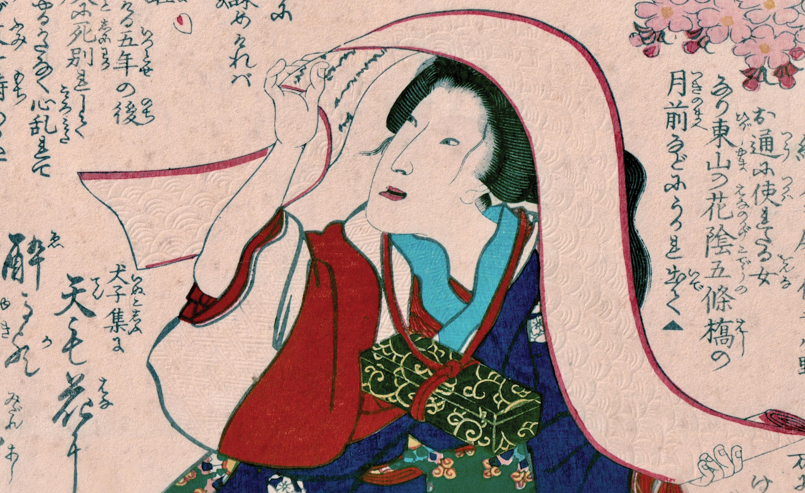Haiku, a traditional Japanese poetic form known for its concise yet evocative nature, has seen contributions from numerous female poets who have left a lasting impact on the genre. Despite historical barriers to women’s participation in literary circles, female haiku poets have emerged throughout history, both in Japan and internationally, to shape and enrich the haiku tradition. In this comprehensive exploration, we delve into the lives, works, and significance of notable female haiku poets, celebrating their contributions and exploring how they have expanded the boundaries of this ancient poetic form.
See also: How to Write an Innovative English Haiku?
Pioneers in Japan: Early Female Haiku Poets
In feudal Japan, where traditional gender roles often limited women’s formal education and artistic pursuits, several female poets made significant strides in haiku and related poetic forms. Chiyo-ni (1703-1775) stands out as one of the most revered female haiku poets of her time. Her poetry, characterized by its simplicity and profound depth, often focused on themes of nature, transience, and the human experience. Chiyo-ni’s ability to capture fleeting moments with clarity and emotional resonance earned her recognition as a master of the haiku form, paving the way for future generations of female poets.
Another influential figure is Ono no Komachi (c. 825-c. 900), a legendary poetess from the Heian period known for her waka poetry, which laid the foundation for later developments in haiku. Her lyrical verses, renowned for their beauty and introspection, continue to inspire poets and scholars today, highlighting her enduring legacy in Japanese literary history.
Global Perspectives: Female Haiku Poets Beyond Japan
Outside of Japan, female poets have also made significant contributions to the haiku tradition, adapting and innovating within their respective cultural contexts. In the United States, Jane Reichhold (1937-2016) emerged as a prominent figure in contemporary haiku circles. Known for her prolific output and innovative approach to the genre, Reichhold’s haiku often blend traditional Japanese aesthetics with modern themes and imagery, reflecting her deep appreciation for both the form’s heritage and its potential for evolution.
Contemporary Voices: Diversity and Exploration
In the 21st century, female haiku poets continue to enrich the genre with their diverse perspectives and experimental approaches. Fay Aoyagi, for instance, explores themes of nature, spirituality, and the human condition in her haiku, drawing on her multicultural background and experiences to imbue her poetry with a sense of universality and introspection. Aoyagi’s works exemplify the ongoing evolution of haiku as a global poetic form, demonstrating its capacity to transcend cultural boundaries and resonate with readers worldwide.
Conclusion: The Legacy of Female Haiku Poets
The contributions of female haiku poets across history have played a crucial role in expanding and diversifying the haiku tradition, challenging conventional norms and pushing the boundaries of poetic expression. From the early pioneers in feudal Japan to the modern innovators of today, these poets have demonstrated a profound understanding of the haiku’s essence—its ability to capture ephemeral moments, evoke deep emotions, and illuminate universal truths about the human experience.
In celebrating the lives and works of these female haiku poets, we not only honor their individual achievements but also recognize their collective impact on shaping the cultural and artistic landscape of haiku literature. Their ability to distill complex emotions and insights into a few spare lines of verse exemplifies the enduring appeal and relevance of haiku poetry in an ever-changing world.
FAQs About Female Haiku Poets
1. What themes are commonly explored by female haiku poets?
Female haiku poets often explore themes such as nature, love, spirituality, the passage of time, and personal introspection. Their haiku frequently capture the beauty of fleeting moments, the cycles of life and death, and the profound connections between humans and the natural world. Many female poets also incorporate themes of identity, cultural heritage, and the human condition into their haiku, providing a rich and diverse tapestry of poetic expression.
2. What impact have female haiku poets had on contemporary haiku literature?
Female haiku poets have had a profound impact on contemporary haiku literature, bringing fresh perspectives and innovative approaches to the genre. Their contributions have expanded the thematic and stylistic boundaries of haiku, fostering greater diversity and inclusivity within the haiku community. By addressing contemporary issues, exploring personal and cultural identities, and experimenting with new forms and techniques, female haiku poets have enriched the haiku tradition and ensured its continued relevance and vitality in the modern literary landscape.
3. How do female haiku poets incorporate their personal experiences into their poetry?
Female haiku poets often draw on their personal experiences to infuse their poetry with authenticity and emotional depth. By reflecting on their interactions with nature, relationships, cultural heritage, and everyday life, they create haiku that resonate with readers on a deeply personal level. Their ability to capture fleeting moments and distill complex emotions into concise, evocative verses allows them to convey profound insights and connect with a broad audience. This personal touch not only enhances the emotional impact of their haiku but also contributes to the rich diversity of voices within the haiku tradition.


